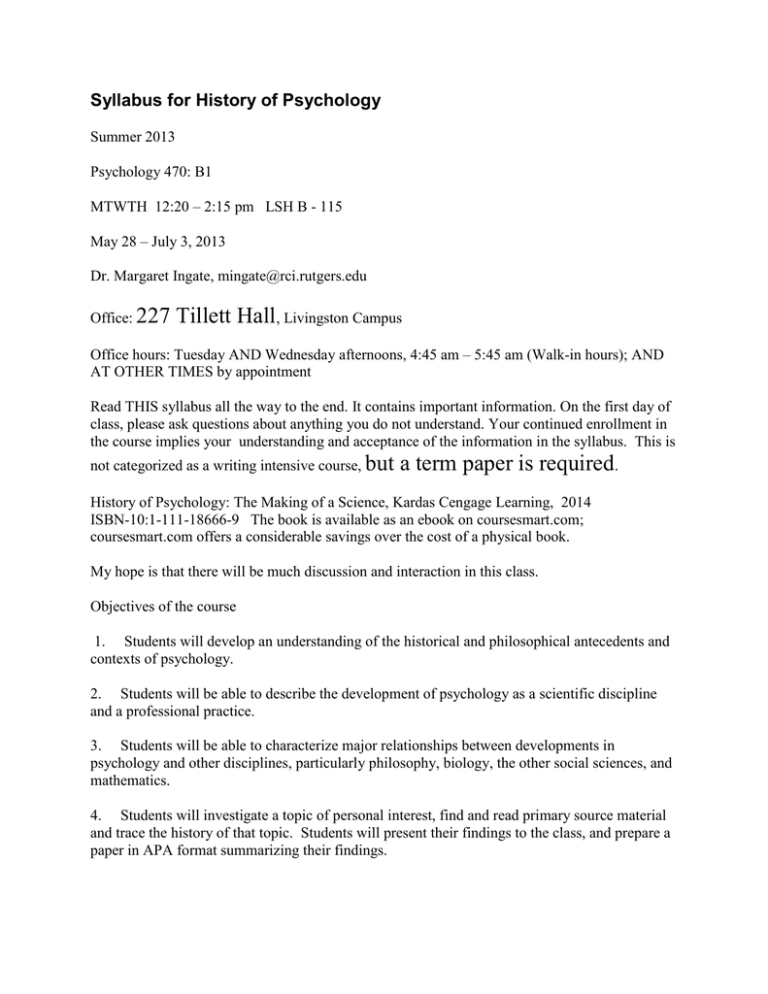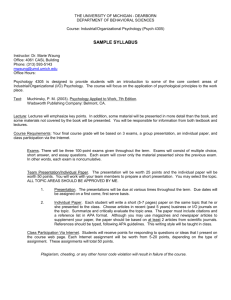Syllabus for History of Psychology
advertisement

Syllabus for History of Psychology Summer 2013 Psychology 470: B1 MTWTH 12:20 – 2:15 pm LSH B - 115 May 28 – July 3, 2013 Dr. Margaret Ingate, mingate@rci.rutgers.edu Office: 227 Tillett Hall, Livingston Campus Office hours: Tuesday AND Wednesday afternoons, 4:45 am – 5:45 am (Walk-in hours); AND AT OTHER TIMES by appointment Read THIS syllabus all the way to the end. It contains important information. On the first day of class, please ask questions about anything you do not understand. Your continued enrollment in the course implies your understanding and acceptance of the information in the syllabus. This is not categorized as a writing intensive course, but a term paper is required. History of Psychology: The Making of a Science, Kardas Cengage Learning, 2014 ISBN-10:1-111-18666-9 The book is available as an ebook on coursesmart.com; coursesmart.com offers a considerable savings over the cost of a physical book. My hope is that there will be much discussion and interaction in this class. Objectives of the course 1. Students will develop an understanding of the historical and philosophical antecedents and contexts of psychology. 2. Students will be able to describe the development of psychology as a scientific discipline and a professional practice. 3. Students will be able to characterize major relationships between developments in psychology and other disciplines, particularly philosophy, biology, the other social sciences, and mathematics. 4. Students will investigate a topic of personal interest, find and read primary source material and trace the history of that topic. Students will present their findings to the class, and prepare a paper in APA format summarizing their findings. Required readings: At my discretion, specific papers may be assigned as course reading associated with particular topics. If these are not available on the PsychClassics website http://psychclassics.asu.edu/ , these will be posted on in the Resources section in a clearly labeled folder. On-line quizzes: There will be periodic online quizzes to help you review material. These are part of your grade and are required. On-line reviews before exams: Before the midterm and the final exam, review exams will be posted on the Sakai site. The reviews are NOT required, though they will help you prepare for the exams. Scores, if any, on these reviews will not affect your grade. TERM PAPER A 7-10 page APA format term paper is REQUIRED. “Required” means that if you do not turn in a paper, you will not receive a passing grade in the course. Students are expected to use primary sources to trace the historical development of an idea, important in psychology, over an extended period (somewhere between 50 and 3,000 years) by identifying and reading selected primary sources related to the topic and relating it to a broader context. Alternatively, students may choose a member of the Rutgers psychology faculty (of Associate Professor rank or higher) and trace and document the intellectual “geneology” of that individual, both in terms of the chain of graduate advisors and the ideas embodied in that individual’s research and publications. Papers that do not conform to the requirements, poorly researched papers, papers with improper/inadequate citations or with plagiarized passages will receive 0 points. For example, a paper about free will would not meet the requirements UNLESS it traced the history of description, understanding, and controversies surrounding free will, over at least the required 50 year period…. and did this using primary sources. Poorly written papers will lose points for the mechanics of writing. Papers that do not conform to APA style will lose points (up to 5) Papers must be submitted electronically (through Sakai, which will upload the paper to Turnitin.com). The paper is due before midnight on Friday, June 28. Turnitin.com will stop accepting papers at 11:59 pm. Papers may be submitted BEGINNING June 16. Turning your paper in early gives you time to correct any improper citations that Turnitin may identify. The following URL contains an extensive explanation of the University's academic integrity policy. http://academicintegrity.rutgers.edu/integrity.shtml In-class quizzes: As most classes begin, we will consider a question concerning previous material. Students will work in groups to generate answers. Bring your laptop or tablet to class to enable additional research on the question. We will discuss the answers as a class. Student Presentations Students are expected to give a 10-minute presentation to the class (PowerPoint, 3 – 5 slides) about their readings within their research topic. Students should be prepared to discuss the topic with the class. Students are strongly encouraged to present their findings BEFORE the paper is written. Presentations will begin Monday, June 24. Exams: There will be two mid-term exams and a cumulative final. The primary format of midterm exams will be take-home essays. The final exam will be multiple choice. Learning and remembering the material covered in this course: Preview the text before you begin any serious reading. Before you read a chapter, skim through it to understand the structure of the authors’ presentation and formulate questions that interest you about the topics covered. Write your questions down, on paper, in your laptop, or on index cards. Then begin to read the chapter, reading for answers to your questions. Stop after every major section. Write (or type) any answers to your questions that you have found. Note any additional questions that you have. Take notes reviewing the major points of the section. Take a break. Then go on to the next section, using the same technique: read for answers, read for questions, record answers to your questions and major summary points. Later in the week, review your chapter questions and notes, review the PowerPoint slides, and review your lecture notes. The material will be easier to remember if you actively organize it and relate it to information that you have already learned. You will learn and retain much more if you attend class regularly and read or at least preview the chapters before we discuss the material in class. Attendance is particularly important in the context of a brief summer course. Behavior in the classroom: As adults, students are expected to behave in a manner that is conducive to learning in a classroom environment. However, should a student's behavior be perceived by the instructor to be disruptive to fellow students in the class, the instructor will ask the student to leave the classroom, and if this recurs, then the disruptive student may be judged unable to successfully complete the course with a passing grade. The schedule below is subject to change. Week 1 2 Dates T May 28 W May 29 Th May 30 M June 3 T June 4 W June 5 Th June 6 3 M June 10 T June 11 W June 12 Th June 13 4 M June 17 T June 18 W June 19 Th June 20 5 M June 24 M July 1 Exam 2: Covering Chapters 7 - 12 Chapter 14: Neobehaviorism – the beginning of the “cognitive revolution” Student presentations start Chapter 15: Gestalt psychology student presentations Chapter 16: Personality and the study and treatment of psychopathology Benjamin Rush through (and beyond) Freud, the DSMs and psychopharmacology TERM PAPER DUE FRIDAY, JUNE 28. Submit online on Sakai Chapter 16 continued, student presentations T July 2 Student presentations, review before final W July 3 Final Exam Covering Chapters 1 - 16 T June 25 W June 26 Th June 27 6 Topic/Assignments Chapter 1: Psychology and the study of history Chapter 2: Who are we and how did we get this way? Chapter 3 Early philosophers and what they contemplated Chapter 4: Greek philosophers and philosophic movements Chapter 5: Observation and reason versus revelation and faith Chapter 6: The Middle Ages and scholasticism Review and relationships to 20th and 21st Century Psychology Exam 1: Chapters 1 - 6 Chapter 7: The rebirth of inquiry, religious and scientific revolutions Chapter 8: Rationalism and empiricism Chapter 9: Modern philosophy, Spinoza through Lotze Chapter 10: The emergence of psychology Chapter 11: Psychology and biology Chapter 12: Henry James and American functionalism Chapter 13: Behaviorism: Pavlov, Watson, McDougall Grading: Grades will be based on a point system with 640 possible points, as follows Each Worth Maximum of: 3 Exams On-line quizzes Term Paper Presentation In-class quizzes 100 points each Average score 100 points 20 points Average score Total 300 points 100 points 100 points 20 points 100 points Participation 20 points 20 points The lowest two scores on in-class quizzes and on on-line quizzes will be dropped before the average scores are computed. Grading standards A 560 points B 500 points C 440 points D 300 points F < 300 points Depending on the distribution of total points, grading standards may be more lenient. Standards will not be tougher if everyone does very well. Cut-offs for “+” grades are determined at my discretion, but will be uniformly applied. If you need a certain average to stay in school, to keep financial aid, to get into graduate or professional school, or just to keep your parents happy, attend ALL CLASSES, study actively, take the quizzes, turn your paper in on time, and review frequently starting at the beginning of the term. Missed exams: If you miss an exam, in general, you get a zero. Don’t miss exams. In the case of extraordinary circumstances (hospitalization, death in the family) you will have to produce documentation; with acceptable documentation, we can make arrangements for a makeup. Special arrangements: If you are entitled to extended testing time or other testing accommodations, provide me with the documentation from the Office of Disability Services, and I will work with them to arrange alternate administration of your exams.


